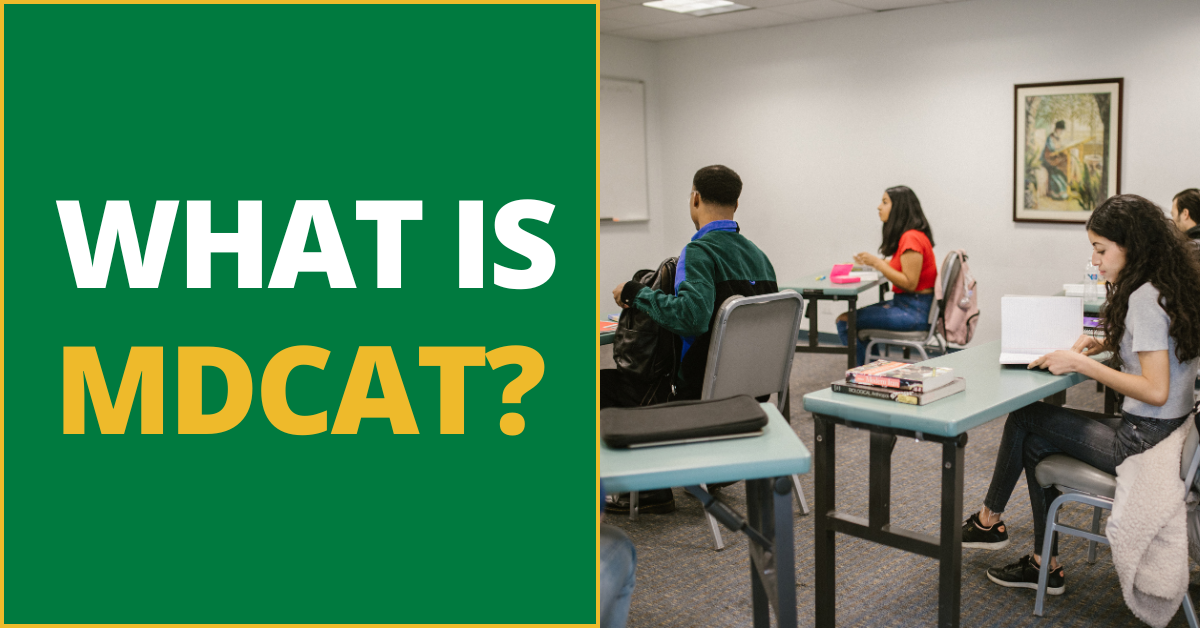If you’re dreaming of becoming a doctor or dentist in Pakistan, you’ve probably heard of the MDCAT test. But what exactly is it? How does it work? What subjects are covered? Don’t worry. I’m here to guide you through everything you need to know about the MDCAT (Medical and Dental College Admission Test) in a simple and easy way.
Whether you’re just starting your pre-med journey or already deep into your preparation, this guide will help you understand the importance of MDCAT, its structure, and how it affects your future in the medical or dental field.
What is MDCAT?
MDCAT stands for Medical and Dental College Admission Test. It’s a standardized entrance exam that you must take if you want to get into MBBS (Bachelor of Medicine and Bachelor of Surgery) or BDS (Bachelor of Dental Surgery) programs in Pakistan.
This test is mandatory for all students whether you’re aiming for public or private medical colleges. It helps evaluate your understanding of science subjects as well as your critical thinking and reasoning abilities.
In short, it’s the gateway to becoming a doctor or dentist in Pakistan.
Why is MDCAT Important?
MDCAT isn’t just another test. It’s a career-defining exam.
Here’s why it matters so much:
- It ensures merit-based admissions to medical and dental colleges
- It creates a standardized evaluation process for students from different educational backgrounds
- Your score directly affects your chances of admission, no matter how well you performed in FSc or A-levels
So even if you got top marks in your board exams, MDCAT is the final hurdle you must clear to secure a seat in your dream college.
Who Conducts MDCAT?
For MDCAT 2025, the exam is being conducted under the Pakistan Medical and Dental Council (PMDC). PMDC is now the central authority managing the test across all provinces.
While provincial medical universities may help with on-ground logistics, PMDC is responsible for:
- Designing a unified national curriculum
- Ensuring standardized policies and merit-based admissions
- Supervising the exam across Pakistan, including AJK and Islamabad
This marks a return to a nationally coordinated MDCAT, replacing the previous provincial testing system used after PMC’s dissolution.
What’s the Format of the MDCAT 2025 Exam?
The MDCAT 2025 will consist of 180 multiple-choice questions (MCQs). You’ll have exactly 3 hours (180 minutes) to attempt the paper.
✅ The exam will be conducted in paper-based format (OMR sheet), not on a computer.
| Subject | Percentage | No. of MCQs |
|---|---|---|
| Biology | 45% | 81 |
| Chemistry | 25% | 45 |
| Physics | 20% | 36 |
| English | 5% | 9 |
| Logical Reasoning | 5% | 9 |
| Total | 100% | 180 |
Note: There is no negative marking, so it’s always a good idea to attempt every question.
What is the Passing Criteria?
To qualify for admission, here’s what you’ll need:
- MBBS: At least 55 percent, which is 99 out of 180
- BDS: At least 50 percent, which is 90 out of 180
Keep in mind that these are minimum passing scores. Actual merit for top colleges will be much higher due to intense competition.
Is MDCAT Computer-Based or Paper-Based?
For MDCAT 2025, the PMDC has officially confirmed that the test will be conducted in paper-based format using OMR sheets.
So if you were worried about digital technical issues, you can relax. Just focus on mastering the syllabus and practicing MCQs in the traditional way.
What Skills Does MDCAT Test?
MDCAT is not just about memorizing your textbooks. It tests:
- Conceptual understanding
- Problem-solving and application
- Time management
- Language comprehension and grammar
- Logical reasoning and critical thinking
This is why mock tests and past paper practice are essential for success.
Who Can Appear in MDCAT?
You are eligible for MDCAT 2025 if:
- You have passed your Intermediate (Pre-Medical) or equivalent with at least 65 percent marks
- You are waiting for results but expect to meet the eligibility before admissions
- You are an A-level student with the required science subjects (you’ll need an equivalence certificate from IBCC)
What is the MDCAT 2025 Fee?
The registration fee for MDCAT 2025 is expected to be:
- PKR 8,000 for Pakistani students
- PKR 40,000 (approx.) for international candidates
Always check PMDC’s official website for the latest fee updates and bank deposit details when registration opens.
When is MDCAT 2025?
The official MDCAT 2025 date has been announced as:
Sunday, October 5, 2025
Mark your calendars and start planning your preparation accordingly. The earlier you start, the better your chances.
Tips to Prepare for MDCAT 2025
Here are my personal tips based on what actually works for students:
- Study smart, not just hard
Follow the PMDC-prescribed syllabus and don’t get distracted by extra material - Practice MCQs daily
Especially for Biology, Physics, and Chemistry - Give extra time to English and Logical Reasoning
These sections are often underestimated - Take full-length mock exams
To build stamina and improve time management - Revise regularly
Don’t leave revision for the last month - Join a study group or coaching center
If you need structure or accountability
Final Thoughts: Your Journey Starts Here
Preparing for MDCAT might feel like a huge challenge right now, and that’s completely normal. But trust me, with daily effort, clarity of goals, and the right strategy, you can get there.
MDCAT 2025 is your chance to step into the medical world and follow your dream of serving others as a doctor or dentist.
I’ll be cheering for you the whole way.
Try our MDCAT Merit Calculator to check your expected aggregate and set your target
Frequently Asked Questions (FAQs)
What does MDCAT stand for?
Medical and Dental College Admission Test
Who conducts MDCAT 2025?
PMDC (Pakistan Medical and Dental Council) is the central body overseeing the test.
How many questions are in MDCAT 2025?
A total of 180 MCQs covering Biology, Chemistry, Physics, English, and Logical Reasoning.
Is there negative marking in MDCAT?
No, there is no negative marking.
What is the MDCAT 2025 date?
The test will be held on Sunday, October 5, 2025.

Dr. Hamza Qureshi is a KEMU graduate and the creator of this platform, dedicated to helping MDCAT students with accurate tools and reliable guidance.
